For Americans, there are very few events that define the 21st Century, or to an extent, their entire lives. That is, except for 9/11.
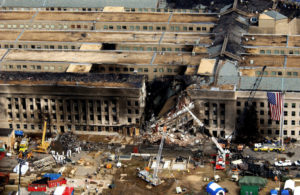
The night before, moms routinely tucked their children into bed, firefighters polished their trucks for the nightly inspection, teachers intricately set up their classrooms, restaurateurs prepared the World Trade Center cafeteria’s servings, families printed their boarding passes out, fathers organized their desks for the next day, and the New York Skyline glistened over Manhattan, symbols of the pride and accomplishments of our nation. Americans did not know that their lives would change forever on September 11, 2001.
As Americans tuned in to their TVs from their living rooms, offices, and or classrooms, they saw an America that had never been seen before–an America under attack. While news outlets televised the events to the world, Americans sat in shock, some crying, some frozen, and some gasping for their lives at the top of the towers.
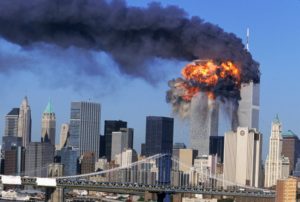
On the planes, husbands called their wives for the last time, passengers wept for their fear and uncertainty, and mothers, fathers, grandparents, aunts, uncles hugged each other, cherishing their last encounter of human life amidst the terror and fright thousands of miles in the air.
Ask anyone where they were “When the World Stopped Turning” and most certainly, they will remember their exact location. Everyone has their own story and memory of that fateful September day.
For Mike Neri, Father of Carson and Marshall ’21, he entered the Pentagon in the early hours of September 11, hugging wife, Susan, and daughter, Madison, expecting another normal work day in the heart of operations for the United States Military, unaware that his world would be changed forever in his close encounters with the attacks that day.
I sat down with my dad, who annually tells his story to middle school audiences, and asked him about his story in the Pentagon on September 11.
CN: “So, tell me a little background information on how you ended up at the Pentagon. What was your career path? How long had you been working there since the attacks?”
MN: “I started working at the Pentagon in May 2001 after having been stationed in Virginia for two years prior. I had only been
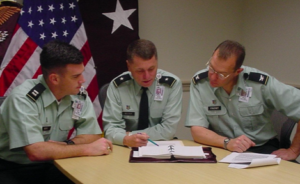
working there for a few months when the attack happened. I was the General’s Aide to the Assistant Surgeon General of the Army, running his office and running the Surgeon’s Army that was physically located in the Pentagon.”
CN: “Do you remember anything specific about the morning? What was your usual Pentagon morning routine, or was it just another Tuesday morning?”
MN: “It was basically another Tuesday morning routine and since I had a young child only a couple months old, my daughter Madison was at home with her mom who had a job on Capitol Hill. Since the baby was young, she was able to work from home, something we can all relate to now with COVID.
So that day, she and I drove to Washington DC. I sat in the car while she ran into her congressional office to pick up some paperwork. And then, she dropped me at the Pentagon, and I went straight to my office, just like normal. Picked up coffee and sat down to get on with my normal day, and then, later on, we obviously heard about the attacks in New York.”
CN: “At what moment did you know the United States was under attack? What were your initial thoughts as you watched the news coverage in New York?”
MN: “When I first heard about the coverage, Susan called me and told me that a plane had crashed into the World Trade Center. Initially, I thought it was a little plane. It didn’t make sense that a massive plane could have collided with the North Tower. I turned on the TV and started watching, and while we were watching the coverage, just like many Americans, we saw the second plane hit, and it was clear then that this was a jetliner. I looked at the colonel I worked with and said, “We are under attack. This isn’t an accident twice in a row.” I knew that this moment could potentially place us at war, so I started thinking about what I needed to do for my job to plan for my boss.”
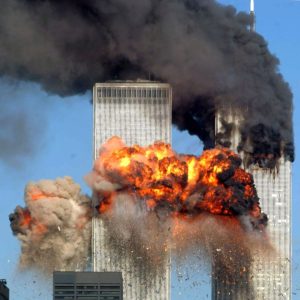
CN: “Was there a sense of panic, urgency, and defeat in the Military Headquarters, prior to the Pentagon attacks? In the 37 minutes between the World Trade Center Attacks and the Pentagon, what was the general vibe in the building, knowing that our nation was under attack?”
MN: “Every office in the Pentagon is isolated, so I wasn’t in the operation center of the Pentagon on 9/11. I was just working in the medical portion with the Surgeon General. During that time, we obviously did not know that we were going to get hit. I immediately began setting up the General’s secure communications, getting things ready out of the confidential safe, expecting that we were going to be doing wartime and emergency planning. I was completing those tasks when the Pentagon was attacked.”
CN: “9:37 am, Flight 77 strikes the Pentagon. What was your first instinct? Where were you located in the building? What did you do as you left the building?”
MN: “At the time, there was a lot of construction going on, so sometimes, we would hear a loud forklift or pipe drop, but this was a massive jolt and noise. I looked for the colonel, since it felt like an earthquake, and then immediately fire alarms started to sound in the building. I then looked at the general and colonel, and I said, “This is related to New York. We are under attack.” At that moment, we knew we had to get out of the building as fast as we could. We didn’t have fire in our office, but since the alarms were going off and our office didn’t have windows, we knew to exit the building.
I opened up the door of the office into the A-Ring of the Pentagon, only three of us in the office at the time. I looked towards the right and saw smoke, dust, and rubble, but to the left, it was perfectly clear. There were some people panicking hysterically and running around. We exited the building very orderly and calmly. Got outside of the building, and that’s when I looked to the left and saw the massive debris field at the point of impact. Our offices were very close to the point of impact, we just happened to be on the interior of the building, not the exterior.”
CN: “Describe how close you were to the point of impact, Ground Zero.”
MN: “So we were in the A-Ring. Our office was in the center. The E Ring is the exterior. What was really coincidental and interesting was when I interviewed for the job in April, our office was in the E Ring. Thankfully, we had relocated as part of the ongoing renovations in the Pentagon. Ground Zero happened to be the partly renovated portion of the Pentagon, right where my office was supposed to be.
A couple days after the attacks, I went back to clear my office for essential documents. It was 80 yards from where my desk was to Ground Zero, the point of impact. The plane penetrated through the E, D, and landed in the C Ring.”
CN: “Did you know any of the victims?”
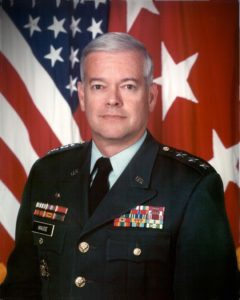
MN: “I did. I knew several. One was Colonel Kip Taylor. He was probably one of the ones I knew closest. The other, the highest ranking Army general and highest military officer killed in the attacks, Tim Maude was a good friend of my boss. Afterwards, I realized many other folks were affected that day, including my coworkers.”
CN: “As you wandered around the Pentagon Rings, watching the “Most Secure Building in the United States” burn to the ground, what were your next actions?”
MN: “The first step was exiting the building. I walked with the secretary to get away from the building because everyone was exiting. Got her walking towards Arlington Cemetery and told her to go home. Then, I called my boss and made contact with him. He said go back to the Pentagon Medical Office, a hospital sized clinic, and gather essential supplies. Since I was a Medical Officer, I went straight there, and we grabbed as many supplies as we could. I had my backpack on and put a bunch of gauze, IV, and whatever we thought we needed to help with emergency services back outside.
We then went into the interior courtyard of the Pentagon, and there, we could see the fire coming into the Pentagon and almost closing around us. I linked up with some other healthcare professionals and medics. We couldn’t go into the building since the fire was too hot, so we were waiting for people to be evacuated. At that point, they said, we need more people out on the crash site, and I volunteered to go help out.
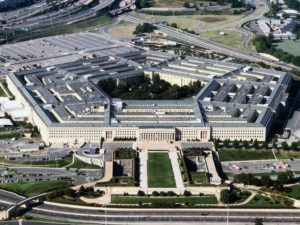
I went through the underground tunnels of the Pentagon, got back out to the exterior of the Pentagon. I had seen it earlier, but now I was walking along the burning grass. There was debris scattered across the lawn, including pieces of metal and building materials. I saw pieces of the plane on the ground, fuselage. In fact, I actually looked to pick one up and just grabbed it, and it was the shelling of the plane. The colonel I was with said, “Hey Mike, don’t touch that, it’s evidence,” so I put it back down.
We assembled out near where the ambulances and first responders began to pull in, so we set to work waiting. Our goal was to hopefully be able to treat people and help and do first aid, but the problem is, since the fire was so hot, unless someone got out immediately, there was no way they were going to survive.”
CN: “Did this day change your perspective on life?”
MN: “Absolutely, it did. It made me think about a whole lot of things. Obviously, the importance of faith and working together and family. Also, how important the global security is and how as a country, this snuck up on us. We had no clue that this would happen and 19 pilots would reek such major mayhem. I was very grateful to be able to be in the military at the time and help out with such a catastrophic event. I was also very grateful to be able to make it home that day, a day when many Americans did not. The day made me focus all that much more on the importance of family and service. My testimony is in the 9/11 Commission Report. But over the following couple of days, I wrote my own narrative about what happened and my feelings at the time. It’s something I go back to and read at least once a year to remind myself. I read it to make sure that I haven’t forgotten, that I’m not being too petty.”
CN: “For those of us who weren’t alive on 9/11, any key takeaways, advice, and wisdom for a new generation that did not experience the event.”
MN: “I would say that no matter what, remember that when you walk out the door every day, not to be dramatic, but it could be the last time. You know, you might lose a loved one in a tragic event without any warning. Words and actions really matter, and one thing I always thought about was all those people who left home that day, either to go to New York or Virginia or the Pentagon or the plane destinations, who were in argument with their family or maybe they didn’t kiss their loved one goodbye or say they loved them or thank them. So that’s the one thing I would say is to remember that every moment is a gift, and we never know when we will be called by God to go home. So try and get beyond the minor arguments and feelings, and never, leave your house mad. Don’t ever leave home without telling your family that they matter to you and how much you love them.”
I encourage all parents, teachers, or former students to share their 9/11 story in the comments below. One way or another, this event affected many aspects of life for all Americans.
